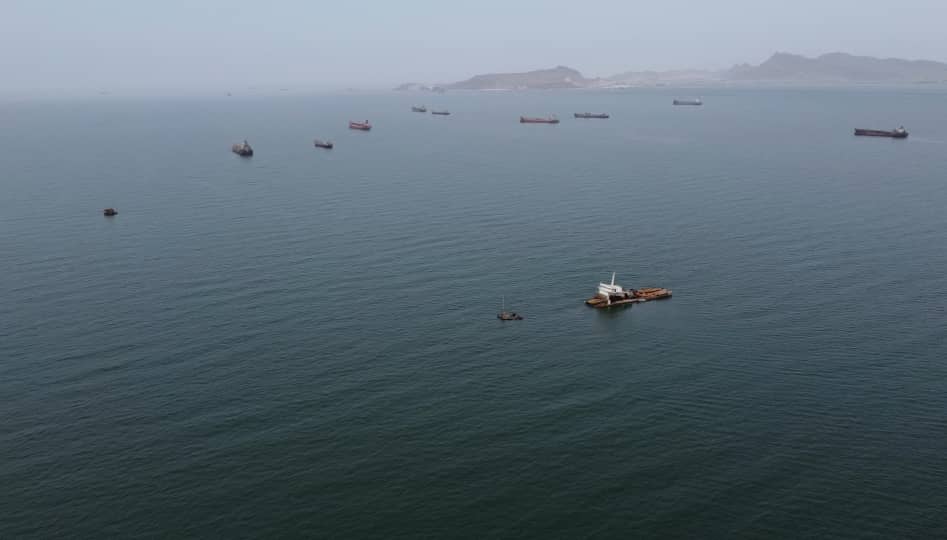
Dilapidated ships in the coast of Aden (A24)
آخر تحديث في: 03-08-2022 الساعة 11 صباحاً بتوقيت عدن
Abdullatif Salmeen (South24)
An oil spill that polluted the coasts of Al-Buraiqeh in the Southern capital city of Aden caused by a dilapidated tanker in early July brought back to the forefront the issue of the severe environmental contamination in the city’s coasts. This comes amid warnings and concerns about an imminent environmental catastrophe which loomed many times over past years due to limited similar oil spill accidents.
One year after the sinking of the oil ship "Dia Boom" [1] in Al-Buraiqeh coast and the subsequent spill of tons of oil, the scene is recurring now with the tanker "Pearl of Athens”. This caused the spill of other amounts of oil which were noticed by local fishermen who saw the formation of a black layer floating on a wide range from the sea level to the coast.
The Pearl of Athens
On July 5th 2022, the coastal line of Al-Buraiqeh district in the west of Aden was the last theater of oil spill incidents in the coastal city. A visible oil spill with a thickness of 14 km leaked from the Pearl of Athens which is one of the deserted and dilapidated ships threatened by sinking in the waterway Aden port.
The ownership of this ship and others is affiliated with “overseas”, the company owned by Yemeni businessman Ahmed Al-Essi. This includes “Dia Boom” which sank last year. Exclusive sources told “South24” that Al-Essi used these floating ships in oil trade before some of them were neglected and others were hired to other influential figures.
On July 22nd, a thread of tweets, [2] by Wim Zwijnenburg, Head of Humanitarian Disarmament Project affiliated with Dutch peace organization PAX revealed the oil leakage off the Southern port of Aden. The tweets were supported by satellite photos captured by the European Space Agency.
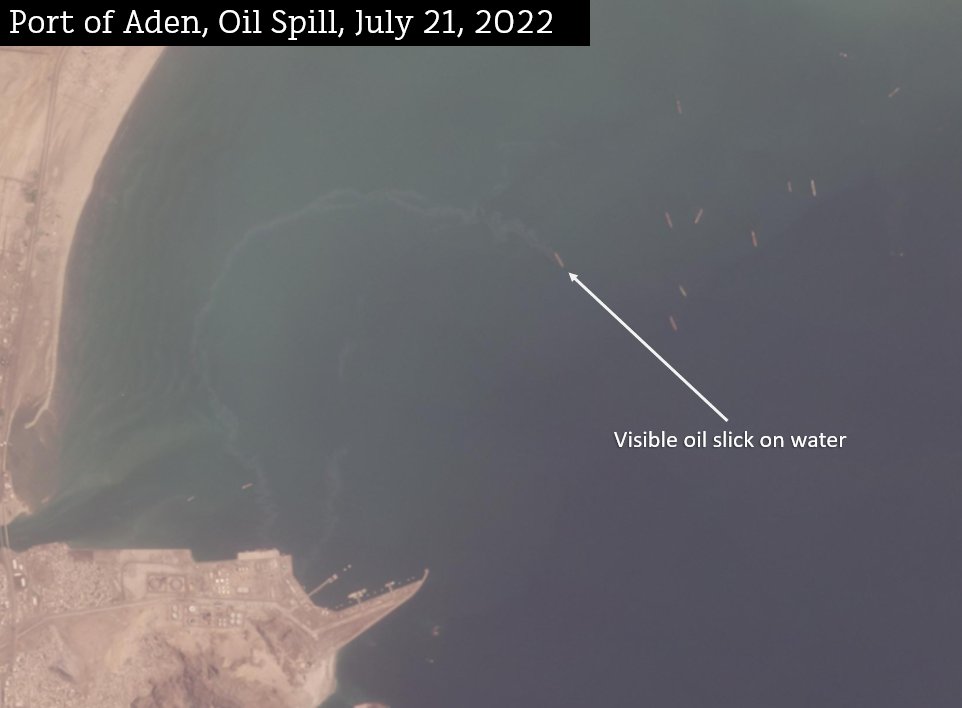
Oil spill off the port of Aden. Satellite image (Wim Zwijnenburg)
On the same day, A formal report issued by the Public Authority for Maritime Affairs in Aden confirmed the occurrence of the oil spill near Al-Buraiqeh coasts. This was a result of leakage from the” Pearl of Athens”. There has been a strong smell of oil. Furthermore, a spot of oil was formed on the water surface in the nearby coastal area.
To investigate this matter, “South24” made a field tour across Al-Buraiqeh coasts. We didn’t see a remarkable impact related to pollution in the water sea, but we monitored a change in the beach sands in Al-Haswa Sea.
Additionally, we notice the spread of black color along the shores near Al-Buraiqeh amid rumors that this is because of the oil spills. However, after following its source, we found that the reason behind this is the discharge of sewage into the sea. Nevertheless, it is possible that sewage water mixed with some leaked oil.
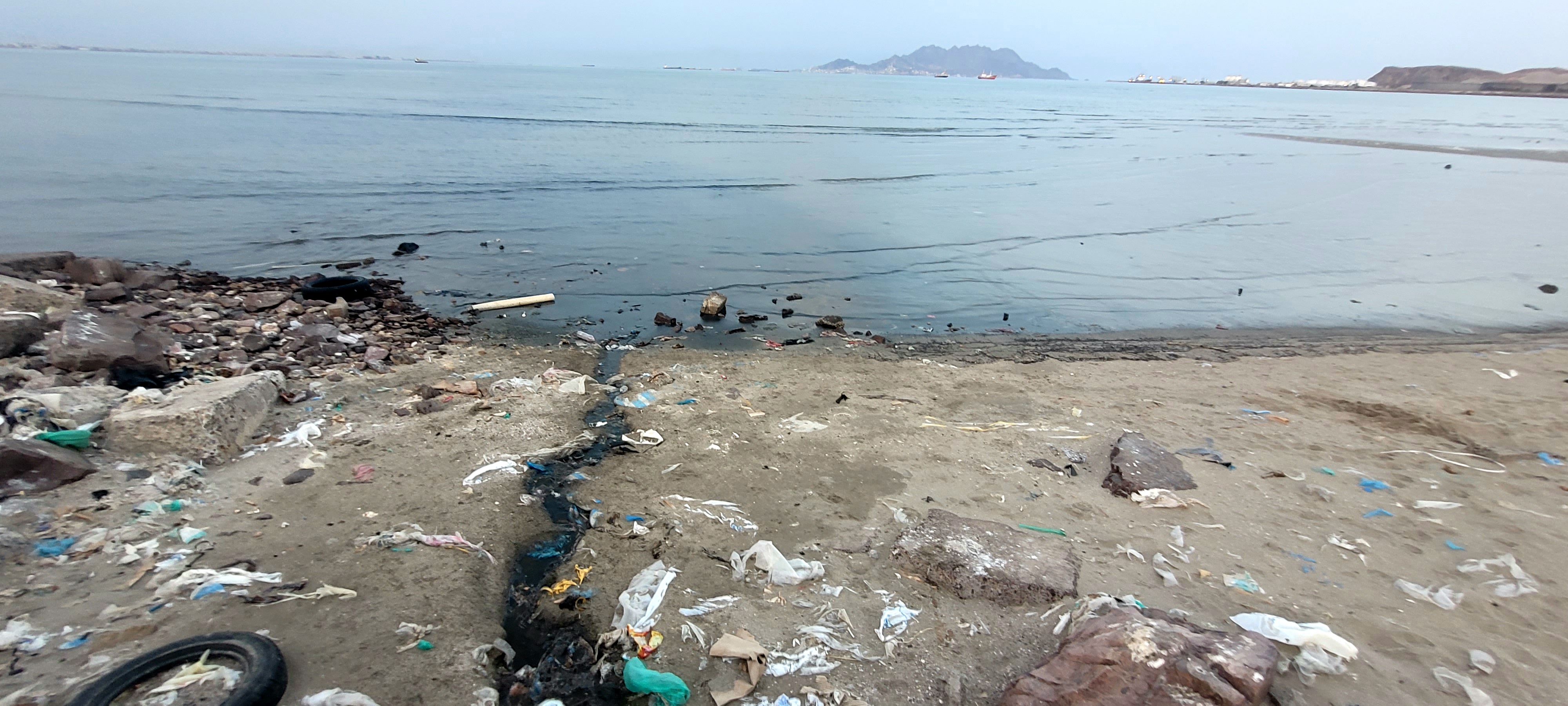
Sewage outlet behind the Al-Buraiqeh Bridge (South24)
Fishermen in Al-Haswa Coast told “South24” that “the impact of the pollution began to emerge on July 3rd”. They added that the effects of the pollution on their daily fishing habits continued in different ways till the end of the third week of the same month. They complained about the sufferings they experienced during past weeks and how their fishing nets were affected due to the spills”.
Abdulhakim Saeed, the Director of the Maritime Pollution Center affiliated with the Public Authority for Maritime Affairs said that the reason behind not finding an instant and direct impact for the oil spill during our field tour is “the water currents and the wind which are capable of scattering any accidental and sudden contamination”.
Saeed told “South24” that “the chronic pollution is the most dangerous one, when an area becomes always vulnerable to the oil spills. We, at the center, fear the difficulty of treating such a pollution unless the source of the oil spills stops completely so that the maritime environment can renew life within it”.
He added: “The latest oil spill is an accidental and a sudden one. Such accidents don’t happen on a daily basis but for each now and then”.
Environmental damages
“When any spill occurs, the oil does not only mix with water, but it floats on the surface and spreads over it in a short period of time”, according to an environmental expert who spoke to “South24” on condition of anonymity.
He added: “This establishes a very thin layer and prevents sunlight from accessing the surrounding environments. This badly affects the sea creatures and the whole food series of the environmental system consequently”.
In this regard, Abdulhakim Saeed said: “Oil contamination is among the dangerous pollutants in the maritime environment as it affects the living natural resources in the polluted areas. The ongoing spill of oil in the sea water certainly harms the maritime environment and its living resources”.
The expert explained the damages which may be caused by “the oil deposits for living habitats such as the nourishing organisms at the beginning of the food chain including the animal and plant habitats which could die even if they are the basis of the food chains”.
As for other maritime habitats such as fishes and others, “they could migrate from the oil- polluted areas to regions which are free from contamination” according to the expert.
For his part, Walid Al-Shuaibi, Director of Monitoring and Environmental Assessment of the Public Authority for Maritime Affairs told “South24” that “these poisonous substances caused by those deposits are very harmful and pose a big threat against the maritime and coastal life as they consist of heterocyclic (ring) chemical substances which are hard to be disintegrated ”.
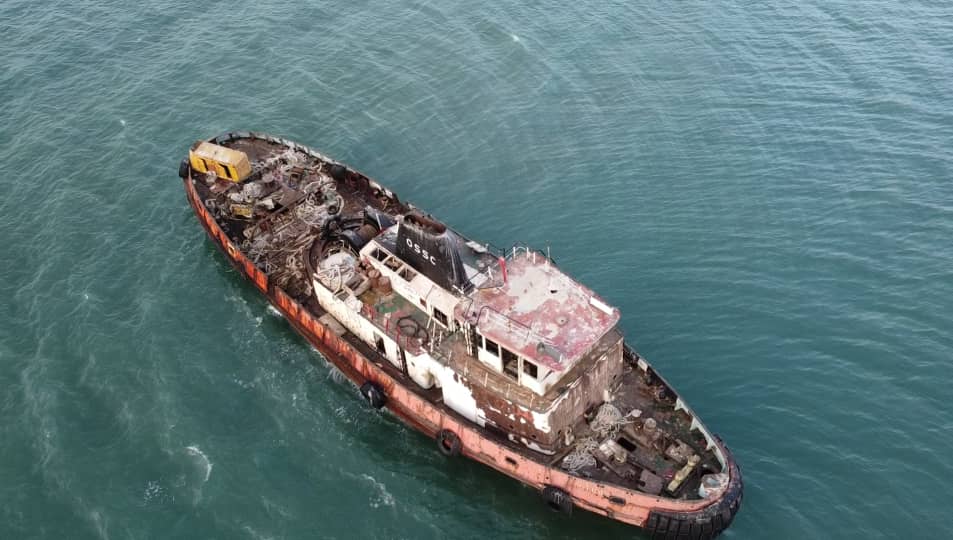
One of the dilapidated ships in the coasts of Aden (A24)
He added: “This requires a lot of time to counter this, especially that both the Public Authority for Environmental Protection and the Maritimes Authority don’t have any capabilities, even a single boat to achieve the combat operation”.
Concerns
On July 17th, oil tanker “Dia Boom”, which sank in the Aden coasts, left behind an oil spill that extended about 20 km. At that time, the British Monitor for Environment and Conflict [3] CEOBS confirmed that the oil spill reached the nearby beaches of Al-Haswa Reserve, which is the only green area in Aden, in addition to the salty areas that have regional importance for the immigrant birds.
The oil tanker which docked in 2013 in its location along with several Dilapidated ships [4] was in an urgent need for immediate maintenance. The relevant authorities failed in preventing the occurrence of an environmental disaster which was avoidable and so its impact on the environmental system”.
It is not the first accident related to ships affiliated with Al-Issa’s Overseas. In July 2013, “Champion 1” [5] ship stranded in the same area while carrying over 4000 tons of mazut. This caused a wide environmental pollution because of the oil spills from the tanker”.
In this regard, Al-Shuaibi said: “Nearly 10 years have passed since the emergence of these ships. All of them are Dilapidated and expired. they variable amounts of oils and mazut. This company is the main cause behind these violations”.
He added: “The latest spill and the one related to the ''Dia” one year ago are not the only two accidents. they occur on a semi- daily basis. Over the month, a number of such spills are monitored as they extend to Al-Buraiqeh and Al-Haswa coasts”.
Environmental time bombs
Sources in the Public Authority for Environmental Protection told “South24" that “there have been nearly 25 idle and useless ships and boats in Al-Istiyad (Fishing) Port in Aden's Hajif, nearly ten of which stranded and sank since 2011”.
Documents obtained by “South24” from the sources on condition of not publishing them confirm that “ all these ships contain remnants of engine oils which are poisonous and dangerous substances. This is along with the ships located in the navigation lane and which suffer from rifts in their walls painted by with polluting and toxic chemicals”.
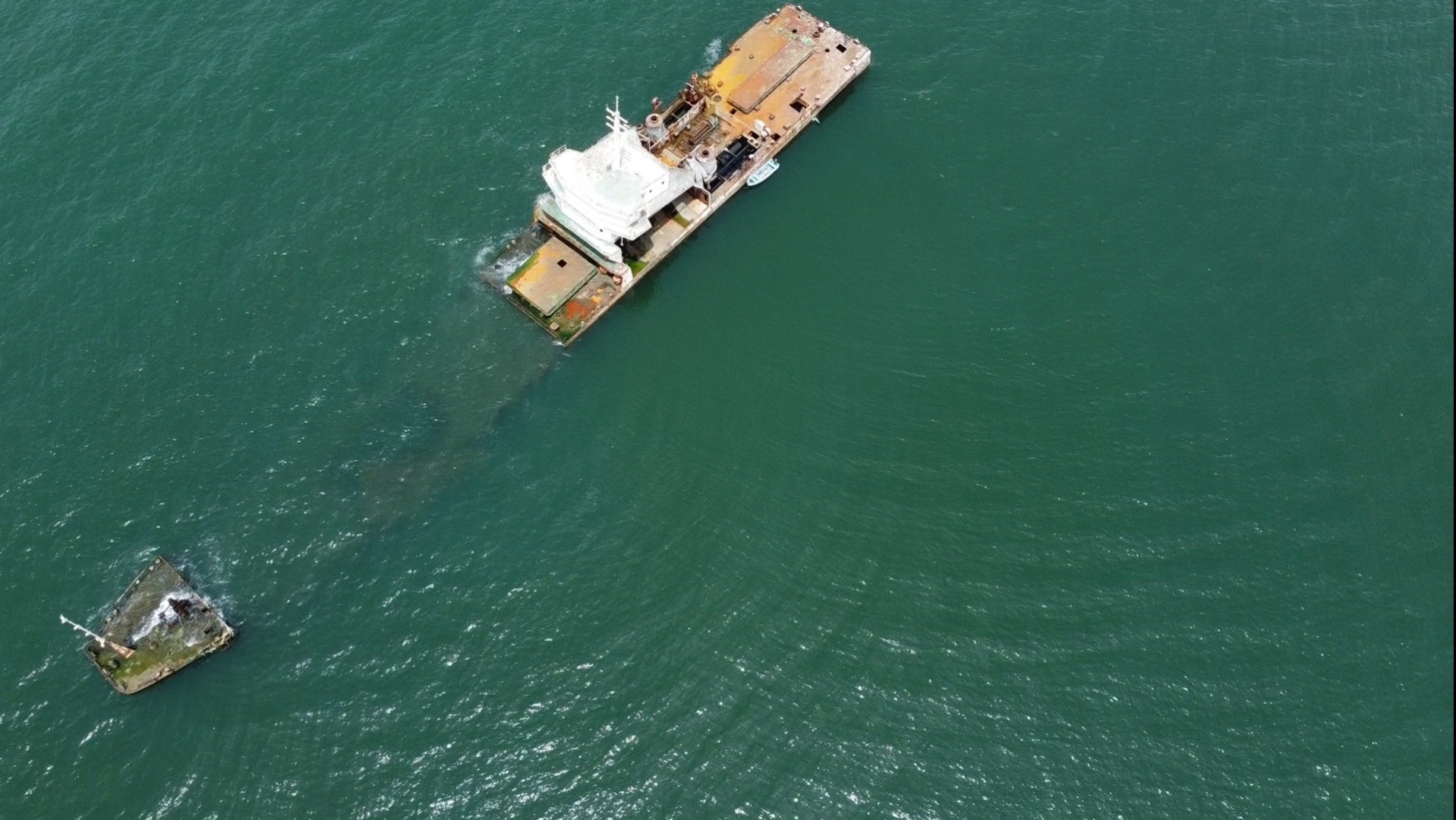
One of the dilapidated ships in the coasts of Aden(A24)
Al-Shuaibi believes that “there are bodies which benefit from all these violations against Aden’s port and sea”. He added that “the threat posed by these ships against seas are more dangerous than oil tanker Safer whose relevant threats are exaggerated and being used as a political pressure card”.
Who is responsible?
According to the decision by the Public Authority of Maritime Affairs, it is responsible for any contamination occurring in the maritime environment”. “South24” attempted to contact the authority to know its measures taken towards what happened but we didn’t receive any response until the moment of publishing this report.
As for the Public Authority for Environmental Protection, Al-Shuaibi said that its role is to “monitor any pollution, damages or violations that occur in the seas and the regional water”. He added: “Since we heard about the spills and saw their satellite images, we began following the incident. Water and Environment Minister, Eng. Tawfiq Al-Sharjabi constantly communicated with us”.
He added: “A team was established at that time. On Friday, we went to the coasts that extended from Al-Haswa to Al-Buraiqeh. Monitoring lasted 3 consecutive days. Later, a technical report about the damages was prepared and sent to the Ministry which in turn sent it to the Prime Minister and the local government”
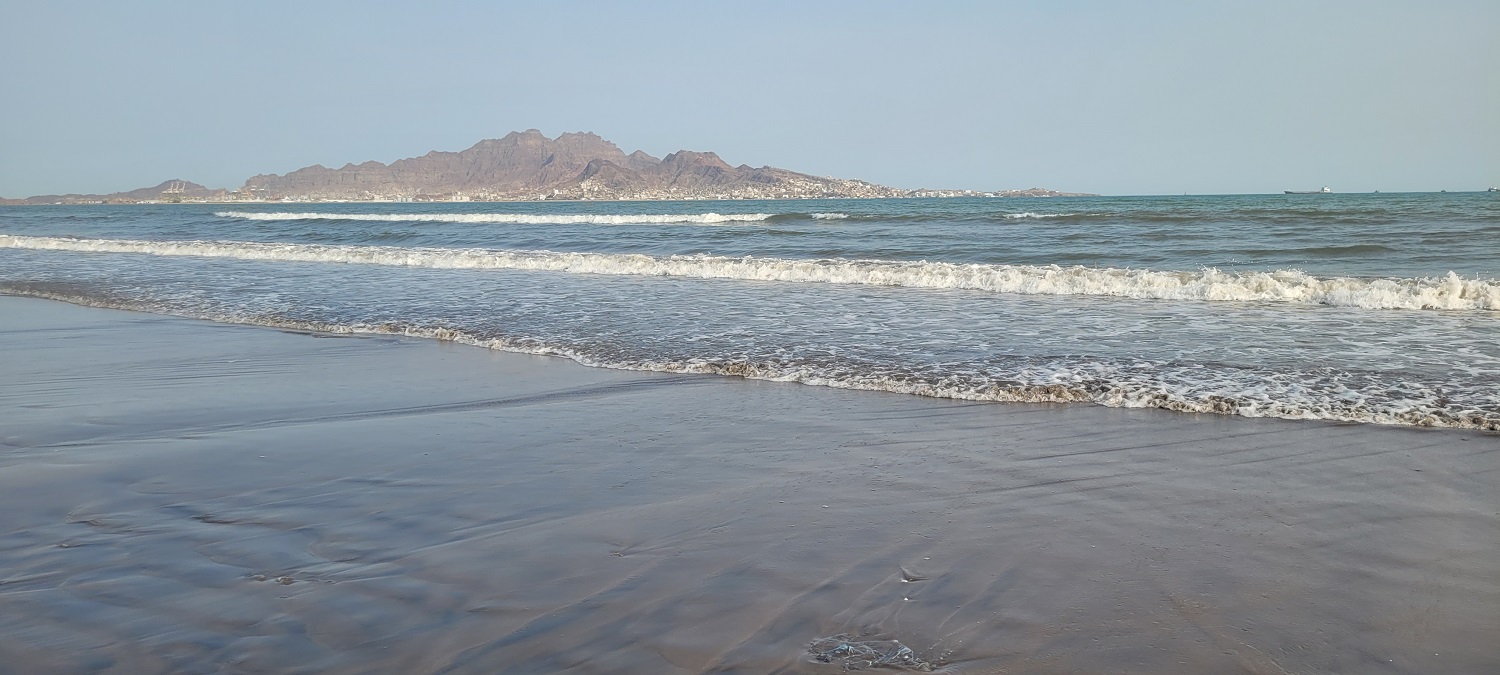
Al-Haswa beach in Aden (South24)
Al-Shuaibi sent an urgent message in which he said: “We wish that the official supreme bodies to consider all sent reports about the Dia accident and the latest one as well as all environmental and legal violations in Al-Istiyad port”.
Al-Shuaib didn’t rule out that this governmental neglect towards the contamination issues in Aden coasts have dimensions. He added: “the silence by the government and its ministries is not justified at all. They ignore saving the port from this deterioration that threatens it in favor of the flourishing of Hodeida and other ports”.
He added: “The minimum thing they can do is to move these ships away from their locations and to hold their owners accountable through legal cases in the prosecution. Furthermore, a technical-legal committee has to be formed to hold them accountable in light of the laws. Afterwards, working to treat these damages has to be carried out as perpetrators shall bear all the costs needed by the process”.
Al-Shuaibi demanded issuing a judicial order that “allows the relevant authorities to move away and tugboat the dilapidated ships as well as selling them in auctions and cutting them into scraps under the supervision of the Public Authority for Maritime Affairs in order to use the revenue in paying the debts accumulated on their owners as a result of their stranding in the navigation lane and the compensation of the damages they caused”.
As for the role of the Maritime Pollution Center, Saeed said: “The Center is not responsible for documenting the transgressions or even holding the perpetrators accountable. I believe that the Public Authority for Maritime Affairs is the one which is the body which is tasked with monitoring the transgressions if it manages to monitor such incidents and prepare proof and conviction reports of any incident that occurs”.
He added: “The presence of multiple bodies led to distracting tasks. We, in the Center, are supposed to have the judicial powers as being a body which is concerned with studying pollutants, maintaining the maritime environment and protecting it from pollution”.
Contamination enhanced by silence
Saeed added: “The maritime environment in the Aden Port areas is usually less clean than other maritime districts. The reason behind this is attributed to the ships’ moves. Sometimes, they dump their wastes or empty the balanced water in the port’s precinct without taking the rules into consideration”.
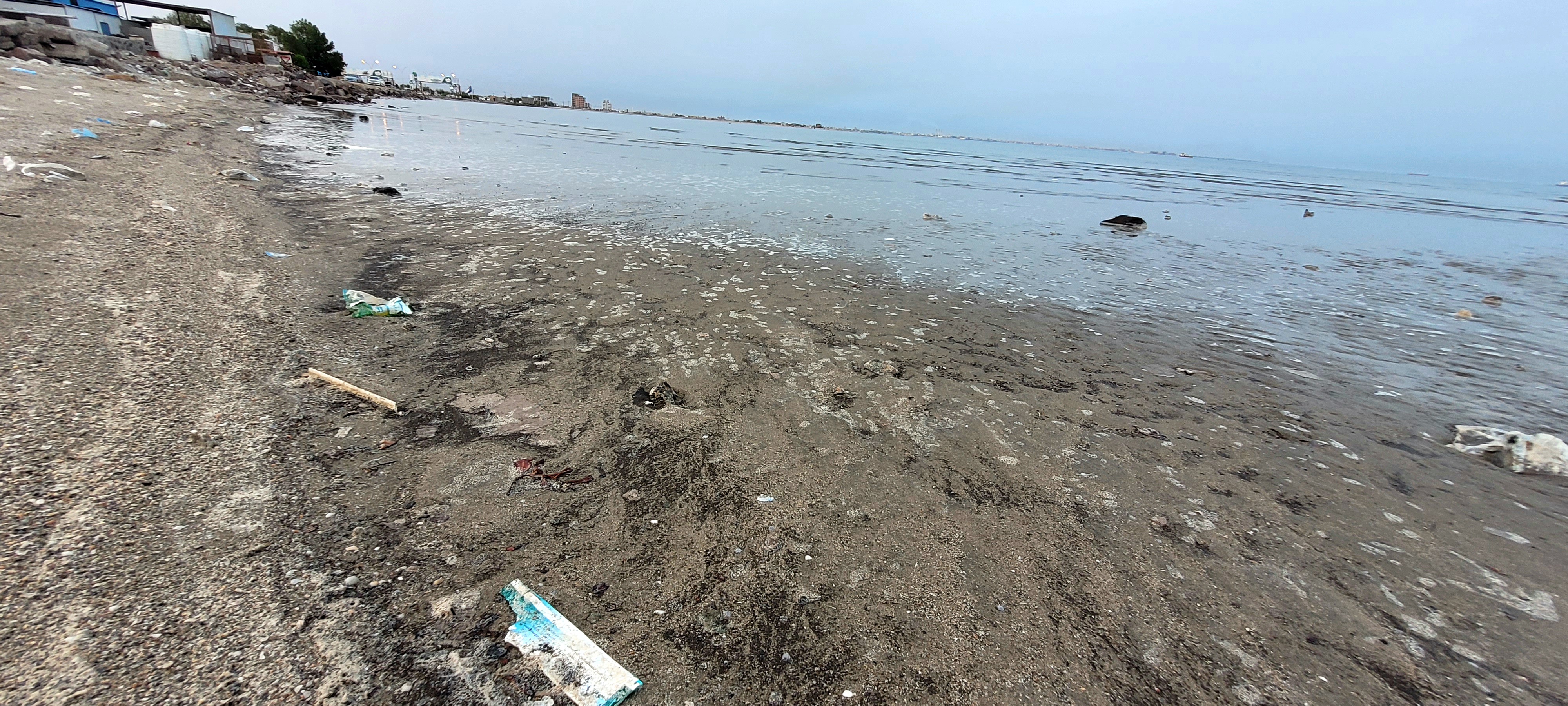
The impact of sea water sewage outlet behind Al-Buraiqeh Bridge (South24)
He added: “The tankers are being washed within the port’s precinct. This in itself is considered violations as it impacts the cleanliness of sea water, and in the long run, the port area could become a polluted one if these violations continue”.
“South24” communicated with Eng. Abd al-Rab al-Khaliji, the Deputy Executive Director of Aden Gulf Ports Organization to show us the policies of monitoring ships but he refrained from responding.
Other causes of pollution
Near Al-Buraiqeh Bridge, where the port and the dilapidated docked ships can be seen, sewage is smelt in the sea water. On the beach sand, the sewage waste is mixed with the overcrowded bags and the human waste swept by sea water towards the shore”.
The beautiful view of the place which is the destination of hundreds of Aden’s populations became distorted and threatened by pollution amid silence and indifference by the relevant bodies.
Saeed said: “What happens is a problem experienced by Aden. Discharge of sewage into the sea without any prior treatment threatens the maritime environment, especially the coastal ones. Overtime, this causes dangerous bacterial contamination in these coasts”.
The expert sent an urgent message to the governmental and the relevant bodies that they have to protect the maritime environment from the dangers of contamination whether inside the port’s precinct or along the shores or elsewhere.
Abdullatif Salmeen
Local journalist

قبل 3 أشهر
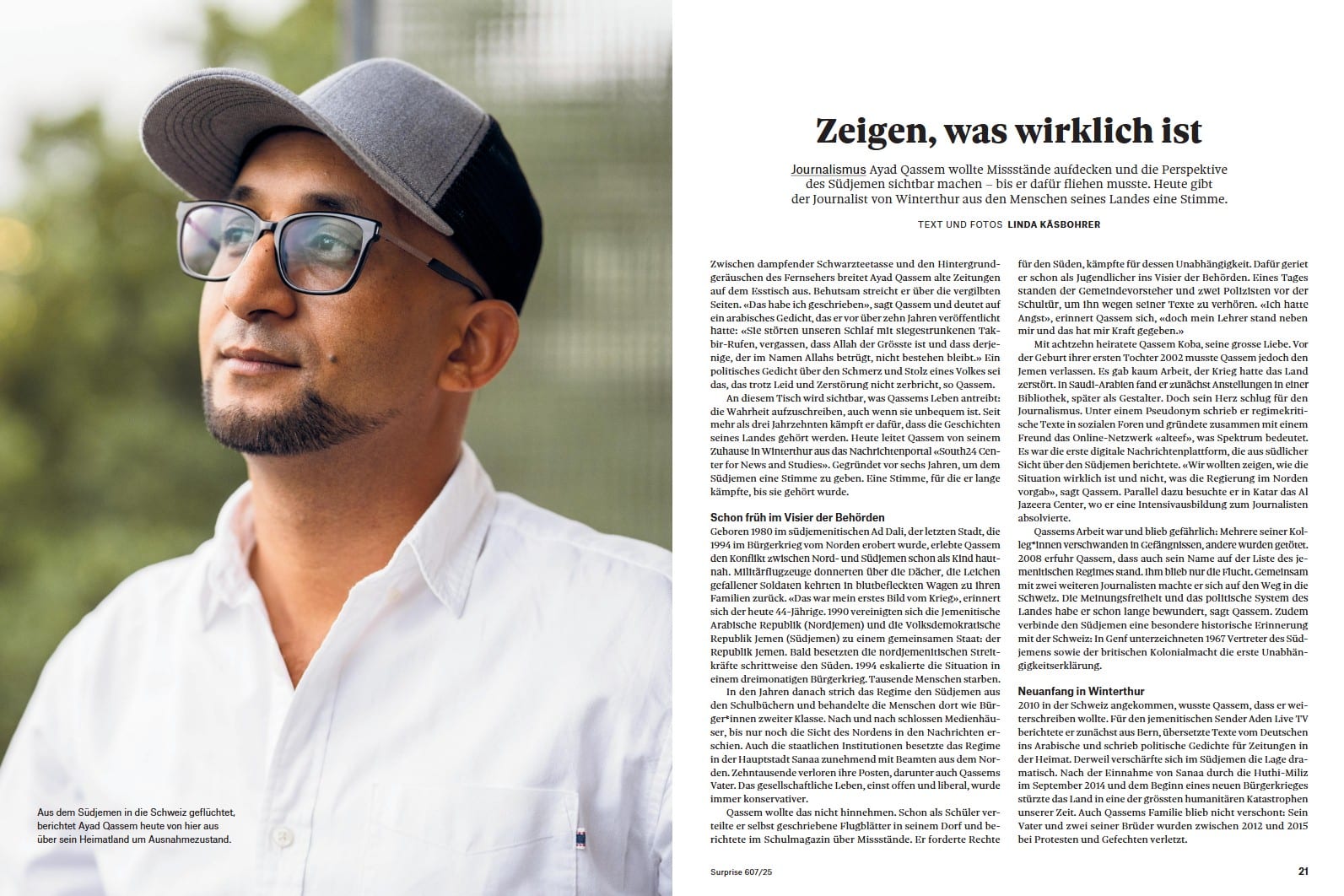
قبل 3 أشهر